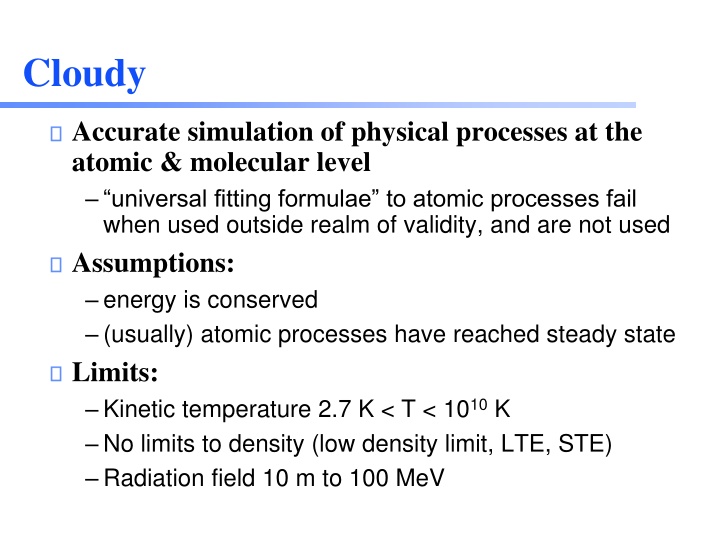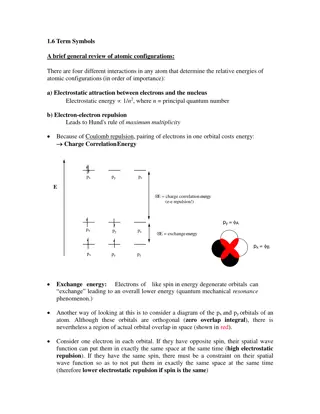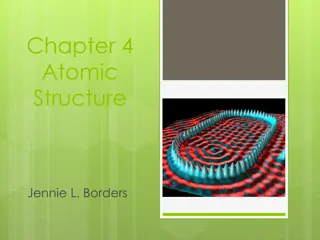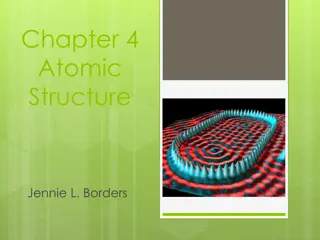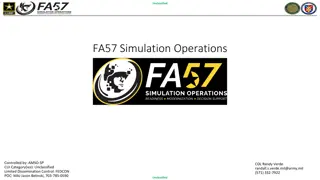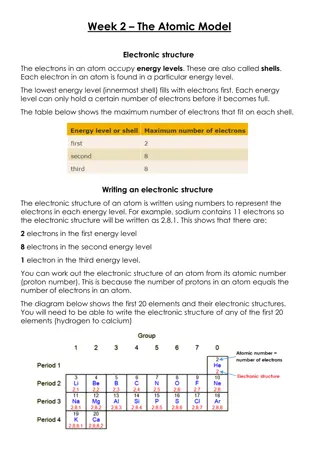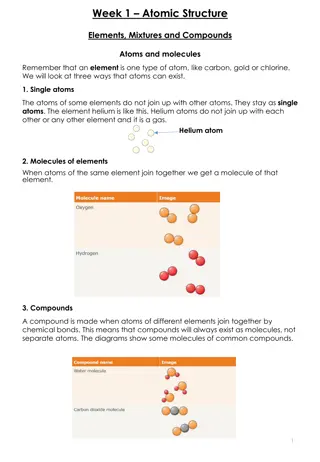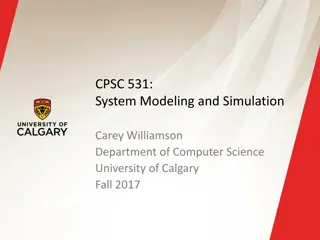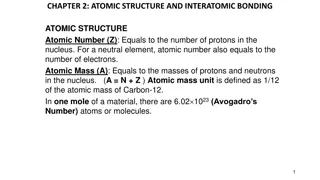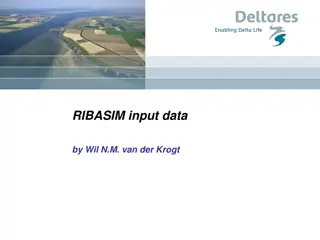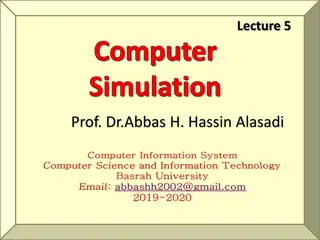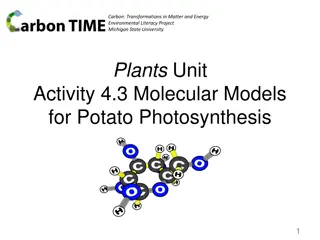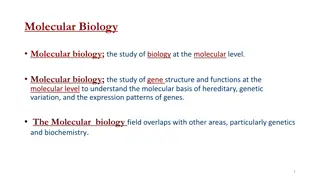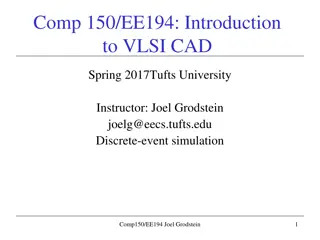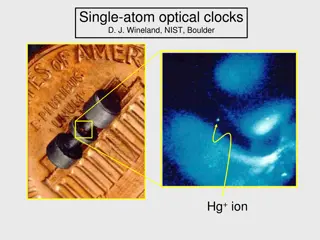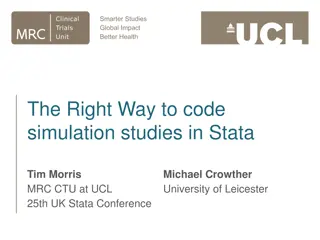Cloudy: Accurate Simulation of Physical Processes at Atomic & Molecular Level
Cloudy is an open-source software that provides accurate simulations of physical processes at the atomic and molecular levels. It uses universal fitting formulae for atomic processes within valid limits of kinetic temperature and density. The software assists in analyzing gas ionization, chemistry, kinetic temperature, grain physics, and radiative transport, with applications in astronomy. Cloudy has been widely cited for its contributions to understanding elemental abundances in high-redshift objects and conditions in various astrophysical regions.
Uploaded on Sep 17, 2024 | 3 Views
Download Presentation

Please find below an Image/Link to download the presentation.
The content on the website is provided AS IS for your information and personal use only. It may not be sold, licensed, or shared on other websites without obtaining consent from the author.If you encounter any issues during the download, it is possible that the publisher has removed the file from their server.
You are allowed to download the files provided on this website for personal or commercial use, subject to the condition that they are used lawfully. All files are the property of their respective owners.
The content on the website is provided AS IS for your information and personal use only. It may not be sold, licensed, or shared on other websites without obtaining consent from the author.
E N D
Presentation Transcript
Cloudy Accurate simulation of physical processes at the atomic & molecular level universal fitting formulae to atomic processes fail when used outside realm of validity, and are not used Assumptions: energy is conserved (usually) atomic processes have reached steady state Limits: Kinetic temperature 2.7 K < T < 1010K No limits to density (low density limit, LTE, STE) Radiation field 10 m to 100 MeV
Simultaneous solution of Gas ionization From ionization balance equations Chemistry Large network based on UMIST Gas kinetic temperature Heating and cooling Grain physics Charging, CX, photoejection, quantum heating The observed spectrum Radiative transport
Cloudy and its physics Osterbrock & Ferland 2006, Astrophysics of Gaseous Nebulae and Active Galactic Nuclei, 2nd edition (AGN3) Ferland+2013, Rev Mex 49, 137, The 2013 Release of Cloudy Ferland 2003, ARA&A, 41, 517, Quantitative Spectroscopy of Photoionized Clouds
Some applications to astronomy Hamann & Ferland, ARA&A, 37, 487, Elemental Abundances in Quasistellar Objects: Star Formation and Galactic Nuclear Evolution at High Redshifts Ferland 2001, PASP, 113, 41, Physical Conditions in the Orion H II Region And the ~200 papers that cite its documentation each year
Open source since 1978 All versions, all data, on svn at nublado.org You are most welcome to help!
Where to go for help https://groups.yahoo.com/neo/groups/cloud y_simulations/info
Documentation Quick start guide Hazy 1, all commands Hazy 2, description of output, comparison with observations Hazy 3, not compiled, badly out of date, some physics is described there
The test suite Fully tests the code after any changes Monitors allow automatic comparison of current with previous results Provides examples of how to use Cloudy But may include extraneous commands for testing Useful examples of how to set up a simulation
Running cloudy run file contains path-to-cloudy.exe -r $ If file model.in contains input, then run model & Produces output model.out
Minimum to run Cloudy Must specify SED shape of the radiation field Flux of photons per unit area Gas density May specify Gas composition, grains (grain-free solar by default) Gas equation of state (often constant density) Stopping criterion, often physical thickness
Parameters the SED Quick start guide Chapter 5 Hazy 1, Chapters 4, 6 Can be specified as a fundamental shape such as a blackbody Generally entered as table of points
SED brightness the intensity case Specify (H) photons per unit area The intensity case predicts emission per unit area Inner radius of cloud does not need to be specified
SED brightness the luminosity case Specify Q (H) photon luminosity Inner radius of cloud must be specified, since (H) = Q(H) / 4 r2 predicts emission line luminosities
The main output The *.out file created when code is executed QSG 7.1 & Hazy 2 Chapter 1 Gas & grain composition Physical conditions in first and last zone Emission line spectrum Mean quantities Cloudy is designed to be autonomous and self aware Will generate notes, cautions, or warnings, is conditions are not appropriate.
Save output Requested with various save commands Hazy 1 Section16.35 and later The main way the code reports its results
The Orion H II Region Based on Baldwin, Ferland, Martin+91 model Layer in hydrostatic equilibrium Only the H II region (so faster) Cloudy / tsuite / auto / orion_hii_open.in 2012 Cloudy workshop
Minimum to run Cloudy Must specify SED shape of the radiation field Flux of photons per unit area Gas density May specify Gas composition, grains (solar by default) Gas equation of state Stopping criterion
Parameters the SED Quick start guide Chapter 5 Hazy 1, Chapters 4, 6 Can be specified as a fundamental shape such as a blackbody Generally entered as table of points
SED brightness the intensity case Specify (H) photons per unit area The intensity case predicts emission per unit area Inner radius of cloud does not need to be specified
SED brightness the luminosity case Specify Q (H) photon luminosity Inner radius of cloud must be specified, since (H) = Q(H) / 4 r2 predicts emission line luminosities
Cloud density hden command Constant density by default Other equations of state possible
Composition Solar, no grains, by default Other standard mixes possible
Open vs closed geometry Hazy 2.3 2014 Cloudy workshop
Covering and filling factors Covering factor AGN3 Filling factor, how to do clumps AGN3, hazy1 2014 Cloudy workshop
Strmgren length 2014 Cloudy workshop
Strmgren length Number of ionizing photons entering layer is balance by number of recombinations along it 2014 Cloudy workshop
Matter vs radiation bounded SL is for radiation bounded, there is an I front Show Abell sphere matter bounded, So phi(H) > SL equation Show pics, give section in AGN3
Beyond the H+ layer Little H+ ionizing radiation gets past the H+ layer Deeper regions are atomic or molecular Also cold and produce little visible light Large extinction due to dust 2014 Cloudy workshop
Clumping Filling factors, when clumps smaller than photon scale length Osterbrock & Flather 1957 Add together distinct clouds, when clumps larger than photon scale length Balwin+ 1995 ApJ 455, L119+
Volume elements in larger structures
